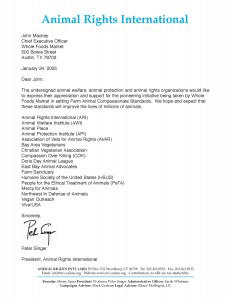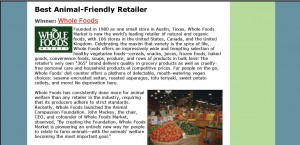Jenna Woginrich, supposedly a former vegetarian/vegan (she has used both terms), has been aggressively pimping “happy meat” for about five years now. She claims:
My beef, after all, wasn’t with beef. It was with how the cow got to my plate in the first place. One way to make sure the animals I ate lived a happy, respectable life was to raise them myself. I would learn to butcher a free-range chicken, raise a pig without antibiotics and rear lambs on green hillside pastures. I would come back to meat eating, and I would do it because of my love for animals.
She advises those who care about animals:
If you really care about the humane treatment of livestock then I strongly suggest you eat them.

Jenna Woginrich with someone whom she will kill out of love, respect, and gratitude
Ms. Woginrich has a new essay: An Open Letter to Angry Vegetarians.
It starts:
This is a letter for the angry folks who think not eating meat makes them morally superior to those of us who do.
Oh, oh: we can see where this is heading.
She goes on to tell us that she was a vegetarian/vegan (she uses both terms) for nearly 10 years, a PETA supporter, and “animal activist,” but has decided that all food involves killing because animals are killed in plant agriculture and harvesting, and growing crops involves other harms, including war, so she produces and promotes “happy” meat.:
The simplest backyard salad from your own organic garden to the fake bacon in your shopping cart — both take lives. I have simply chosen to take lives in a way that causes the least amount of suffering and causes the least amount of wasted global resources. And yes, it means there is blood on my hands now.
The truth is there is no meal we can eat without killing. None. A trip to your local grocery store for tofu and spinach may not include a single animal product but the harvesting of such food costs endless animal lives. Growing fields of soy beans for commercial clients means removing habitat from thousands of wild animals, killing them through deforestation and loss of their home.
Eating meat you raised means eating food infused with integreity [sic], sweat, loyalty, determination, love, friendship, memories, loss, perserverance [sic] and respect.
And none of these things are ingredients you will not find on a package of tofu no matter how close you look.
And Ms. Woginrich complains that those who disagree are violating her human rights:
Eat in whatever way invokes respect and gratitude in your soul. Be grateful we live in this time of contrived and soon-to-be over luxury and abundance. But do not come to battle here, accusing those of us raising good meat of murder. Those are fighting words, unkind words, and for someone so intensely passionate about treating animals well you seem to have no issue treating human beings like crap. I’m an animal, too. I would appreciate some ethical treatment.
So what is there to say about Ms. Woginrich’s position? I could say a great deal. But I think four comments will suffice.
First, and as a preliminary matter, Ms. Woginrich should not confuse disagreement with “anger.” It is very common these days for those who are criticized for promoting animal exploitation to whinge about being “attacked” or “bullied,” or lament their status as victims of “anger.” I certainly agree that people should not address Ms. Woginrich in uncivil ways. But disagreement with and reasoned criticism of Ms. Woganrich, who is profiting from exploiting and killing animals, and who is actively promoting animal exploitation, does not amount to incivility or anger.
Second, Ms. Woginrich has no clue about basic ethical reasoning. She appears to think that morality is a matter of personal preference and nothing is inherently morally wrong. People may be put in jail for killing other humans, but that’s just a matter of a legal convention. There’s nothing inherently morally wrong with intentionally killing a human.
I suspect that this is a good part of the reason why Ms. Woginrich sees herself as victimized by disagreement. If she sees fundamental moral issues as involving nothing more than a preference, then it would be natural for her to think that disagreement, including substantive, principled, and reasoned disagreement, is an expression of “anger.”
I note that her blog says that we can look forward to see her writings about the Civil War. Given her moral subjectivism, I will be curious to see if she defends human slavery as well. After all, on Ms. Woginrich’s view, the morality of human slavery is just a matter of preference. There’s no moral truth there.
And if Ms. Woginrich maintains that there is moral truth where humans are concerned but not where nonhumans are concerned, then’s she is merely another speciesist who begs the question from the outset and engages in circular reasoning.
So, without saying more, if you don’t accept moral subjectivism (and no one does except when they are thrashing about continually trying to convince themselves that exploiting the vulnerable is morally acceptable), and you reject speciesism, then Ms. Woginrich’s position collapses.
I should add that Ms. Woginrich seems to think that murder, as a legal term, involves killing with “malevolent intent” and that deliberate killing done with “gratitude,” “respect,” and “love” is not the requisite culpable mind state for murder. That’s wrong. Murder involves killing a human in a premeditated or deliberate way. The mercy killing of a loved one suffering from a painful illness done out of love and compassion is premeditated killing and constitutes murder. And Ms. Woginrich clearly is killing animals with premeditation even if, as she rather incredulously claims, her heart is overflowing with “gratitude,” “love,” and “respect” for the nonhumans she exploits and kills. This is, of course, not to say that Ms. Woginrich is guilty of murder because murder is a crime defined to involve humans only. But her claim that her mind state in killing animals is not the mind that would allow for a conviction of murder if a human were involved is, like most of what else she says, wrong.
Third, Ms. Woginrich’s argument in a nutshell is: we can’t live perfectly so it’s fine to kill nonhumans. But that’s just silly.
I agree that living involves indirectly harming nonhumans and humans. When we build a road, we know that some humans will be killed on that road. Does that mean that there’s no difference between building a road and intentionally killing humans? Of course not.
I agree that everything we consume involves indirect harm to nonhumans and humans, and that we all need to consume a great deal less. But does the fact that the manufacture of a product may have resulted in the negligent death of a human or nonhuman mean that there’s no difference between that negligent death and an intentional killing of a human or nonhuman? Of course not.
I agree that the harvesting of crops involves unintentionally harming animals and humans who are killed or injured in the agricultural process. But if we were all vegans, there would be many fewer acres under cultivation. Professor David Pimentel of Cornell University has written that livestock in the United States consume 7 times as much grain as is consumed by the entire U.S. human population and the grains fed to livestock could feed 840 million humans who had a plant-based diet.
Should we do everything possible to avoid any unintentional nonhuman (and human) deaths that occur during harvesting? Of course. But does the fact that unintentional deaths will occur however careful we are mean that intentional deaths of nonhumans and humans are morally justifiable? Of course not.
And if we all took veganism seriously as a fundamental moral issue, would we develop better ways to avoid that unintentional harm? Of course we would.
Ms. Woginrich proudly proclaims that the animals that she raises and kills are being fed with “local non-GMO feed grown by our neighbors.” And do her neighbors harvest that feed without unintentionally killing animals? No, of course not. So she’s participating in the unintentional deaths and the intentional ones. It is clear that her position–that unintentional deaths cannot be avoided so the intentional ones are morally acceptable–is frivolous on this basis as well.
In a passage that actually caused me to laugh out loud, Ms. Woginrich, who remarkably appears to think that her happy exploitation of nonhumans is a matter of progressive politics, claims that because plant fertilizers are made from petroleum and because petroleum is used to transport plants, the choice is between supporting local farmers or supporting wars that are really about oil. This is political analysis that makes George W. Bush look like Jean-Jacques Rousseau.
Fourth, and most problematic from my perspective, Ms. Woginrich is the quintessential modern animal activist. She represents the happy exploitation movement that is the modern “animal movement.” She is the result of an ideology that expresses “appreciation and support” for the “pioneering” happy exploitation of Whole Foods.

(Click to make image larger.)
So according to Peter Singer, PETA, Farm Sanctuary, Mercy for Animals, Compassion Over Killing, Vegan Outreach, and the other welfare charities that compromise the “animal movement,” Ms. Woginrich is doing just fine. I am surprised that she has not received a letter from Singer. Maybe she has. After all, there’s no difference between Ms. Woginrich and Whole Foods CEO, John Mackey. I am shocked that HSUS CEO/President Wayne Pacelle, who sits on the Board of Directors of the Global Animal Partnership, has not visited her farm for a pre-slaughter photo opportunity with her animals.
Ms. Woginrich’s animals have it great:
They have had one bad day, one bad moment actually, and that moment surprised the hell out of them.
That’s actually even better than Whole Foods’ Animal Welfare Rating Step 5! I don’t think John Mackey would make that claim.
Indeed, what Ms. Woginrich is promoting is sounds similar to what Singer describes:
[T]o avoid inflicting suffering on animals—not to mention the environmental costs of intensive animal production—we need to cut down drastically on the animal products we consume. But does that mean a vegan world? That’s one solution, but not necessarily the only one. If it is the infliction of suffering that we are concerned about, rather than killing, then I can also imagine a world in which people mostly eat plant foods, but occasionally treat themselves to the luxury of free range eggs, or possibly even meat from animals who live good lives under conditions natural for their species, and are then humanely killed on the farm.
(Peter Singer, Interview in “The Vegan,” 2006)
So where’s her letter from Singer? Where’s her award from PETA, who gave Whole Foods an award?

(Click to make image larger.)
Interestingly, the large animal charities also embrace the moral subjectivism that informs Ms. Woginrich’s position. There is no moral truth; it’s just a matter of preference. But you cannot have a movement for social justice that sees justice simply as a matter of preference.
So, alas, in all respects, Ms. Woginrich is the “animal activist” that Peter Singer and the rest of the “movement” want her to be.
Ms. Woginrich even has a “donate” button on her page. That makes perfect sense. The whole happy exploitation movement is about buying indulgences for engaging in morally unjustifiable behavior. So I don’t blame Ms. Woginrich for cashing in as well.

(Click to make image larger.)
And the fact that Jenna Woginrich fits so comfortably as an “animal activist” is precisely the problem. She is a perfect illustration of the animal confusion movement that embraces happy exploitation.
*****
If you are not vegan, please go vegan. Veganism is about nonviolence. First and foremost, it’s about nonviolence to other sentient beings. But it’s also about nonviolence to the earth and nonviolence to yourself.
And never, ever buy into the nonsensical notion that we need to promote “happy exploitation” in order to get people to go vegan. In addition to the whole “happy exploitation” effort being profoundly speciesist, the “happy exploitation” effort has one goal: to make the public more comfortable about animal exploitation.
The World is Vegan! If you want it.
Gary L. Francione
Board of Governors Distinguished Professor, Rutgers University
©2014 Gary L. Francione
The post PROFILE OF A MODERN “ANIMAL ACTIVIST”: JENNA WOGINRICH appeared first on Animal Rights: The Abolitionist Approach.
Related posts:
The Modern “Animal Movement” in a Nutshell (1)
The Modern “Animal Movement” in a Nutshell (2)
The Modern “Animal Movement” in a Nutshell (3)
The Modern “Animal Novement” in a Nutshell (4)
The Modern “Animal Movement” in a Nutshell (5)